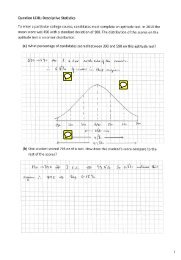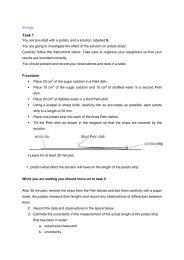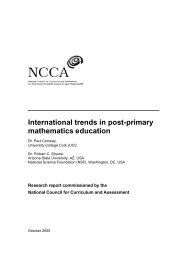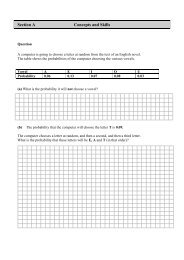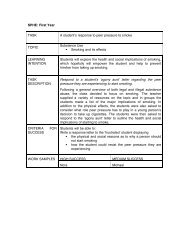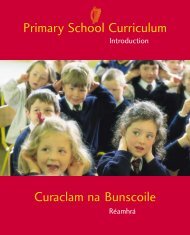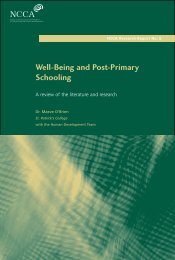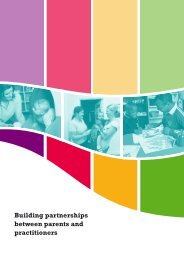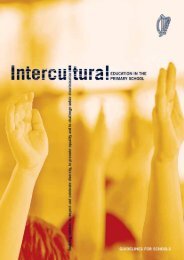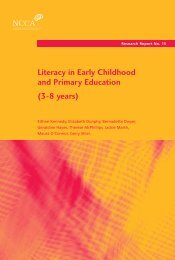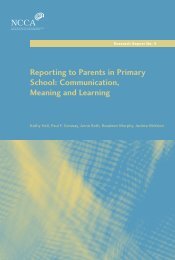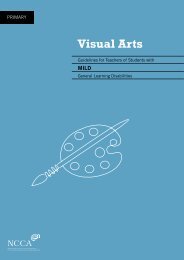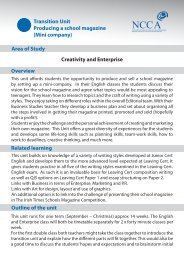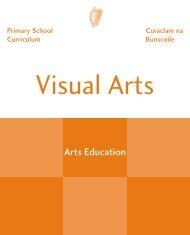Up and Away - National Council for Curriculum and Assessment
Up and Away - National Council for Curriculum and Assessment
Up and Away - National Council for Curriculum and Assessment
You also want an ePaper? Increase the reach of your titles
YUMPU automatically turns print PDFs into web optimized ePapers that Google loves.
190<br />
Names <strong>and</strong> countries<br />
Class organisation<br />
Whole class.<br />
Theme<br />
Myself.<br />
Aims<br />
Practise saying names.<br />
Ascertain initial impression of<br />
pupils’ word recognition <strong>and</strong><br />
reading skills.<br />
Materials needed<br />
Photocopy the sheet of blank<br />
flash cards on page 191 two<br />
times.<br />
Preparation<br />
Write pupils’ names on one<br />
sheet of cards <strong>and</strong> their<br />
countries on the other. Include<br />
your own details. Cut out the<br />
cards.<br />
Notes<br />
Pupils may not know the<br />
English names of their<br />
countries. Be prepared to spend<br />
some extra time on the<br />
pronunciation of the countries<br />
at this stage of the class*.<br />
This is an excellent activity <strong>for</strong><br />
the first class.<br />
In the matching activity ask<br />
pupils to try <strong>and</strong> read the<br />
names <strong>and</strong> countries of their<br />
classmates. This helps you assess<br />
their reading skills.<br />
Remind the pupils to say ‘My<br />
name is ________’ <strong>and</strong> ‘I am<br />
from ________’ be<strong>for</strong>e turning<br />
over the cards, as this is the<br />
language focus of the class.<br />
Stage 1 – Speaking<br />
Focus Time<br />
40 minutes.<br />
Type of activity<br />
Chain activity.<br />
Matching activity.<br />
Approach<br />
1. Spread out the first-name flash cards on a table, say, “My<br />
name is ______” <strong>and</strong> remove the flash card with your name<br />
on it. Invite pupils to do the same.<br />
2. Start a chain around the class, ‘My name is ______. What is<br />
your name?’ As each pupil gives his/her name, he/she takes<br />
the flash card from the table. Repeat two or three times.<br />
3. *Repeat the above process with the country flash cards,<br />
practising the language ‘I am from ______. Where are you<br />
from?’<br />
4. Shuffle the two sets of cards <strong>and</strong> spread them out. The<br />
chain is now, ‘My name is ______. I am from ________’ with<br />
the pupils taking their cards as they say the sentences.<br />
5. Indicate different pupils, saying their names. If you can’t<br />
remember, ask, “What is your name?” Invite pupils to do<br />
the same. Repeat this process with countries.<br />
Matching activity<br />
1. Spread out the first-name cards in one area of the table <strong>and</strong><br />
the country cards in another. Both sets are face down.<br />
2. Say, “My name is ______” <strong>and</strong> choose a card from the<br />
appropriate group on the table. If the card doesn’t have<br />
your name on it, return it to the same place face down. The<br />
turn passes to the next pupil. If the card has your name, say<br />
“I am from ______” <strong>and</strong> try to find ‘your’ country card in the<br />
other group. The winner is the first person to find their<br />
matching in<strong>for</strong>mation.<br />
Extension<br />
Pupils find this an enjoyable activity <strong>and</strong>, <strong>for</strong> language beginners,<br />
it is an ideal way to practise sentence structures such as:<br />
‘His name is ________. He is from ________’.<br />
‘My sister’s name is ________. She is from ________’.<br />
‘I am from ________. I speak ________’. (language)<br />
‘My name is ________. I like ________’. (food, sport, seasons,<br />
clothes, etc.)



